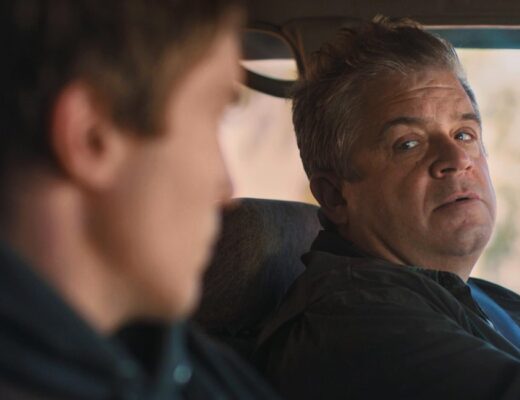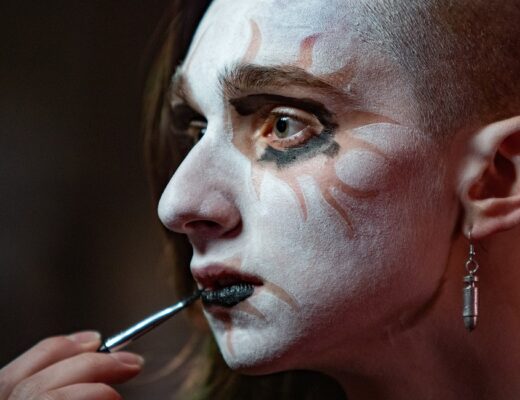The Father can veer into indulgence, but largely works as a nuanced, compassionate portrait of aging’s ravages.
Like the captain of his soul, Anthony — played by Anthony Hopkins, his renowned namesake — is in charge at the helm, stoutly defending against the elements and braving the incoming storms. He commands attention, attracts ire, irradiates confidence: a man of and with his house. But the soul is fraying, and Anthony, try as he may, hasn’t mastered his fate. Fate has mastered him instead, stranding him onboard a deck of falling cards, resigned to his mutinous subjects. “The rats are leaving the ship,” he barks at his daughter, Anne (Olivia Colman), suspecting that she harbors plans to wait out his death and seize control from him. “I am not leaving my flat!” Physically mobile and perpetually rambling, the father first exerts charming effect, and then cantankerous resistance on the visitors he receives in his abode, including Anne. Lounging within its stately walls, sipping tea and soaking in classical music, he lives a royal if retired life, seemingly independent from outside assistance. Quickly, however, the world shimmers and distorts; his watch is missing, and he pins it on the unseen caregiver who, Anne insists, has quit in tears after his verbal tirades. Then a man appears, claiming the flat as his own. At the doctor’s, she once again denies his long-standing belief of her moving to Paris. With wry irony, he winks at the doctor: “She’s forgotten.”
This irony, intended for viewers, is naturally lost on him. Anthony, a victim of dementia, has also lost most of his bearings; time and space, no longer chronological or continuous, drift around at random, furnishing details and inventing figments where, concurrently, memories are fragmented and particulars generalized. Dementia patients understandably lack cognizance of their situation, Anthony being no exception. With a combination of fierce denial and stubborn vigor, he spars with his debilitating mental state, angrily and hopelessly mired in its disequilibria. Roughly broken into ten scenes, each altered by an inexplicable presence or reality, Florian Zeller’s distressing first feature underpins its narrative with a slippery ontology, taken not as grandstanding metaphysical trademark but as crucial device to interpreting, as closely as possible, the workings of Anthony’s mind. Unlike Werner Schroeter’s Malina, a psychologically and aesthetically subjective chamber drama likewise confined to the chamber’s geographic solipsism, The Father exchanges Schroeter’s psychoanalytic excesses for a tempered realism; tempered in the sense that its incongruous manifolds comprise an underlying fabric tethered to the external world but only selectively receptive to it.
Adapted from the acclaimed La Père, Zeller’s own 2012 play, The Father subsumes the former’s theatrical staging into a filmic presentation of gradual mental deterioration which, in its later sequences, begins to wear due to an overstayed welcome; throughout the fluctuating nights and days, Anthony’s perception unravels, but to no particular end except in itself. Yet, while it teeters towards dramatic exercise at times, The Father mostly engenders quiet devastation in its humble depictions of an affliction equally inflicted regardless of sex or social background. Zeller deliberately sketches Anthony thinly, with his surrounding interactions more ephemeral than consequential, their dramatic ingredients looped and echoed through his shifting consciousness. Anne reassures him that, contrary to the tap-dancing he gladly performs for his enchanting new nurse (Imogen Poots), his expertise had always been in engineering. Two men jostle for the position of Anne’s husband, but she isn’t a practicing polygamist. Her “brighter” sister, evidently deceased for a while, becomes a recurrent conduit of pain and pity for daughter and father alike.
That these manipulations of perspective are smoothly maneuvered by way of Zeller’s ingenious simplicity of set design attests to The Father’s successful stylistic economy. Confronting the totalitarian violence of memory’s loss, the film rightly forgoes spellbinding, Freudian artistry in favor of banal circumstances that equally mystify and terrify: a turn of the corner, a disappearing figure, a person shape-shifted, a house not quite the same, its layout slightly off. Trapped in the labyrinth of his own mind, Anthony soon makes way for a doddering husk of himself, vulnerable to the understandable frustrations of his children and carers. The most striking aspect of the film, however, lies in its ontological fluidity vis-à-vis perception and intention. Even as Zeller portrays emotional abuse exacted upon Anthony, there simply remains no conclusive way of proving their existence beyond his imagination. Likewise, when Anthony — in a rare bout of affection — compliments his daughter’s “nice hairstyle”, thanking her “for everything,” she can only smile at him sadly, for how should she acknowledge these words, not knowing in what capacity they are uttered? There are no satisfying answers to the disease which eats at the very memories and essence that once defined the aging man, and, while The Father closes on this wistful note, it’s worth contemplating this line from William Ernest Henley’s Invictus: “Under the bludgeonings of chance / My head is bloody, but unbowed.” In documenting this bludgeoning with compassion and sincerity, Zeller resists cruel submission, and captains aging’s dignified soul.







